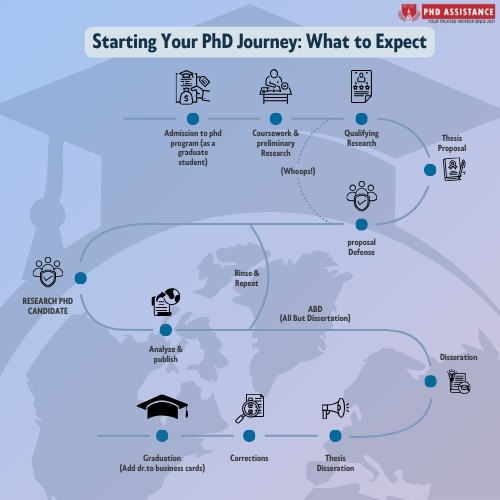Simplifying the PhD Journey: Expectations, choosing a Program and Advisor, Writing and Defending Your Dissertation
Introduction:
It has always been a question. Why would someone desire to pursue PhD studies if they have already achieved significant success in their field? Regardless of the sort of PhD, the reasons, and motivations for seeking it are complicated and varied, ranging from self-achievement to personal growth. Sometimes one must analyze their research skills academically, or they may have realistic career-oriented aims, or perhaps self-enrichment is the motivation. In that case, after jumping into doctoral studies some students struggle with the requirements, and for some, the PhD journey can be disruptive, leading to existential crises. To begin working on your PhD, you must have realistic expectations about the thesis, the research environment, and the supervision relationship.

Defining the PhD journey: Stages and expectations:
The first stage of the PhD journey is the initial research through literature review and proposal development. During this phase, you will engage yourself in extensive literature reviews, identify gaps in existing research, and formulate a research question that will guide your study. It is essential to consult with your external advisor and committee members to refine your proposal and ensure it aligns with your field of study. [1]
Once your proposal is approved, you will enter the data collection and analysis stage, which is where the bulk of your research work takes place. Depending on your field, data collection methods can vary widely, ranging from experiments to analyzing existing datasets or conducting surveys. Careful data analysis is important for being more organized.
The subsequent stage is questionnaire data analysis and interpretation. Here, you will employ various statistical techniques or qualitative analysis methods to make sense of your collected data. This stage requires a deep understanding of research methodologies and statistical software tools. It is common to encounter challenges or unexpected findings during this phase, but perseverance and seeking guidance from your advisor and peers will help you overcome them.
Once you have analyzed your data, you will move on to the writing your literature and publication stage. In this phase, synthesize your findings, craft powerful arguments, and present your research coherently and compellingly. Maintain regular communication with your advisor to ensure your writing aligns with the expectations of your field and the academic community.
The last stage of the PhD journey is defending your research in front of your committee. This oral examination, commonly known as the dissertation defense, is a significant juncture. It is an opportunity for you to showcase your knowledge, defend your research methodology, and address any questions or critiques from your committee members. Preparing well for this defense, practicing your presentation, and anticipating potential questions will boost your confidence and increase your chances of success.
Choosing the right program and research topic
When choosing a program, you should examine the university’s reputation and rating, the faculty’s experience in your subject of interest, the resources, and facilities available, and the overall academic climate. Take the time to research other colleges and their offers, visit open houses or virtual information sessions, and contact current students or alumni to learn about their experiences.
Just as important is selecting a study topic that is relevant to your interests, passions, and long-term ambitions. Your study topic should be something you are genuinely interested in and want to learn more about. Consider the relevance and significance of the topic in your field, the availability of resources and data, and the possibility of contributing to knowledge.[2]
It must be done to ensure that your research topic is feasible within the time constraints of your Ph.D. program. Consult with possible advisers or mentors to determine the plausibility of your research concept and seek their advice on refining your research question.
PhD Assistance Craft Scholarly Narratives, Not Just Topics, to Help You Shape Your Doctoral Path. Experience exclusivity with our PhD Topic Selection Service, where we do more than just offer topics; we construct your study journey with precision, providing accurate information and unquestionable justification. Let your academic genius shine from the start!
Selecting an advisor and building a strong mentorship relationship
When choosing an adviser, you should evaluate their competence in your field of study, their availability and readiness to provide advice, and their fit with your working style. Take the time to learn more about potential advisors, read their publications, and speak with current or previous students under their supervision. This will provide you with useful information about their mentoring style and commitment to their students’ achievement.
Once you’ve decided on an advisor, you must develop a strong mentorship relationship. Effective communication is essential in this process. Set up regular meetings to discuss your progress, difficulties, and goals. Prepare for these meetings by creating specialized agendas and bringing any relevant materials or questions. This will showcase your dedication and aggressive attitude to your research.
Discuss your study objectives, timetables, and any potential challenges you anticipate. Make sure you’re both on the same page on the scope and direction of your study. Regularly updating your adviser on your progress and receiving input can help you stay on track and gain important perspectives.
Writing and defending your dissertation
The process of writing your dissertation can be intimidating but breaking it down into manageable chunks can make it more attainable. Begin by outlining your research topic or thesis statement, as well as developing a clear chapter plan. Set aside time for writing and create a schedule that works for you. Remember to set aside time for research, data analysis, and literature review. [3]
A dissertation needs significant study and critical analysis. It is important to reference relevant scholarly materials, journals, and books to back up your arguments and statements. Take detailed notes, acknowledge your sources, and organize your findings in a systematic manner. This ensures that your dissertation is well-supported by existing literature and adds to the body of literature in your field.
To succeed in defending your dissertation, serious preparation must be done. Rehearse your presentation several times, anticipate potential queries, and be ready to defend your views with confidence. Seek input from your adviser or mentors and make required adjustments to bolster your defense.
Perhaps, try PhD Assistance – Your Research Guide. From various subjects to global scholars, our comprehensive approach, collaborative technique, and skilled staff have redefined the pursuit of greatness in Ph.D. research. Join us where borders blur, disciplines converge, and success knows no bounds!
We hope our blog post on simplifying the PhD journey was helpful and instructive. Pursuing a PhD can be a scary and demanding task, but with the information and guidance provided in this article, you can confidently move along the path. Remember to set reasonable goals, create a disciplined routine, seek guidance from mentors and peers, and emphasize self-care along the way. With effort and dedication, you can overcome hurdles and achieve your PhD goals. Best wishes and congratulations on taking this important step toward becoming an expert in your area!
References:
- Cooksey, R., McDonald, G., Cooksey, R., & McDonald, G. (2019). Why Am I Doing This and What Should I Expect?. Surviving and Thriving in Postgraduate Research, 1-26.
- Skakni, I. (2018). Reasons, motives and motivations for completing a PhD: A typology of doctoral studies as a quest. Studies in Graduate and Postdoctoral Education, 9(2), 197-212.
- Trafford, V., & Leshem, S. (2002). Starting at the end to undertake doctoral research: predictable questions as stepping stones. HIGHER EDUCATION REVIEW-LONDON-, 35(1), 31-49.
 Previous Post
Previous Post
